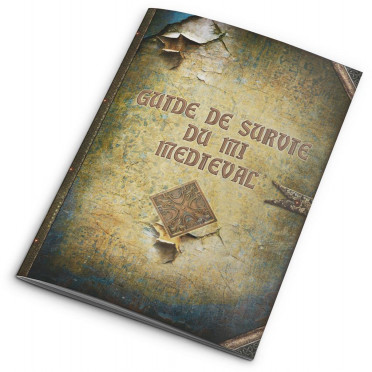Le Guide de survie du MJ - Médiéval
REMAEF02
Red price
- French
The Medieval Encyclopaedia is a book aimed at developing the context of the Middle Ages for players of Medium Aevum.
It is based on Moeurs, Usages et Costumes au Moyen-Âge et à l'époque de la Renaissance, published in 1871 by the historian Paul Lacroix (who also worked with Alexandre Dumas on some of his novels).
It opens with 6 pages of title, credits and an introduction (Un Héritage, 1 page), as well as two full-page illustrations, before the summary.
Rights and Conditions of Persons (16 pages) is first devoted to the situation of the different classes of society, starting with the King, the Nobility and the commoners, including the bourgeois who are beginning to appear as a social category with the multiplication of the Communes. The rights and duties of each are reviewed.
Marginal Populations (10 pages) then focuses on two populations that were excluded from Christian society, either because of their religion (the Jews) or their status (the beggars). The first part looks at the bad reputation of the Israelites and the persecutions to which they were regularly subjected. The second part covers the history of the companies of hoodlums in the cities, the courts of miracles that developed there and the language that allowed the beggars to discuss, slang.
Le Quotidien (26 pages) revolves around the life of everyone in these times, from the King and the pomp of his court, and the nobles in their castles, to the bourgeois in the towns and the villains in the countryside. The text deals with food and drink habits (11 pages), as well as clothing (6 pages).
The Economy (16 pages) turns first to trade, its problems (notably the variable units of measurement, such as the pound, which could vary by 1 to 4/3 depending on the town), and its advantages (with the rise of paper replacing parchment, the use of Arabic numerals, etc.). Craftsmanship follows with the history of the craftsmen's guilds, their rivalries and struggles, the regulations that concerned them, and the particular case of the Compagnonnage. Finally, 3 pages give an overview of the tax system of the time.
Justice (16 pages) first reviews the bodies that dispensed it, whether official in France or secret (the Assassins, the Red Earth Tribunal of Westphalia, the Venetian Council of Ten...). The second part looks at the procedures, including the use of the Question to obtain confessions, but also the penalties incurred and the profession of executioner.
Finally, Les Loisirs (22 pages) discusses the entertainment of the nobility (hunting, venery and falconry), as well as that of the people, whether it be games, shows or dances, or local or other festivals (the coronation of the King) and the customs and traditions of the ceremonies of each social class.
Product Family
Copyright © 2025 www.philibertnet.com Legals - Privacy Policy - Cookie Preferences - Sitemap





